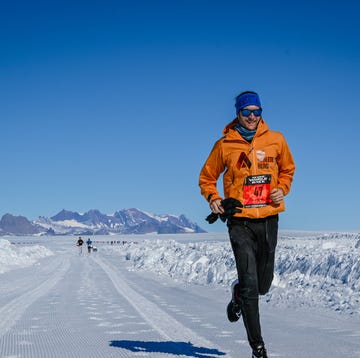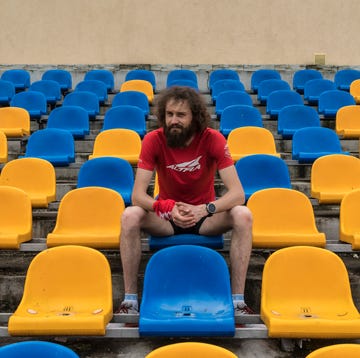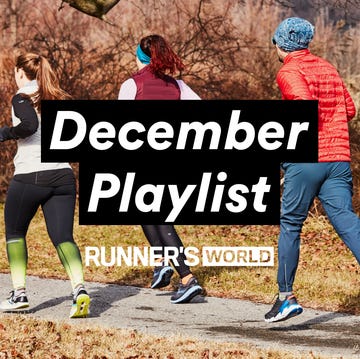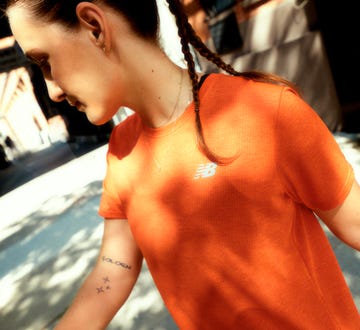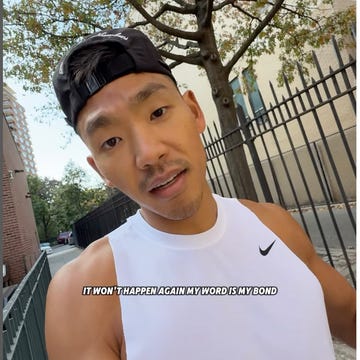It’s hard not to curse the very existence of larger thighs when they occasionally cause you pain, both physically and emotionally. For as long as I can remember, I’ve had—let’s call them “dominant”—thighs. My mom tells me I’ve had thick thighs since I was a baby, but the difference between having them as a 14-month-old and as an adult is that chunky baby legs are cute. As a pre-teen, teen, and young adult, they just led to a whole lot of frustration for me.
Before I go any further, let me say this: I recognize that every single person has a different definition of what “big” may be and that size is relative. For me, “big” means I can’t wear certain split shorts regularly because I’m uncomfortable. It means that during warm-weather runs and races, I’m hesitant to wear even longer shorts because of the chafing that could happen (and yes, I have tried every chafe stick from MegaBabe to Bodyglide). It means that the actual weight of the muscles, bones, and fat that make up my thighs can sometimes make even easy runs feel heavy and harder than they should.
And it means that all of this has led to a lot of frustration because as a self-conscious, yo-yo dieting teen and young adult, I felt like no matter how “small” I got, the “big” thighs would remain.
Other Hearst Subscriptions.
During my freshman year of college, my weight crept up to just over 200 pounds. For some, this can be a healthy, happy weight. For me, it wasn’t. I didn’t feel at home in my own body, I felt highly self-conscious and alone, and knew that I needed to make a change if I wanted to show up better in my day-to-day life.
So I picked up healthier habits, like better portion control and skipping out on my daily side of tater tots at lunch. I started integrating more regular movement into my schedule, leaving earlier for my classes so I could take a longer route for more steps. And of course, I started running—slowly at first, a half-mile a day. But then, my love affair with running truly took off, inspiring me to tackle longer distances.
To this day, I’ve lost and kept off about 70 pounds. But the thighs remain.
Nutrition - Weight Loss marathon finish lines, and did a ton of self work (read: therapy), I got to a place where my internal dialogue toward my body wasn’t so nasty. I started to reframe the way I looked at my “big” thighs, recognizing their impressive strength. That strength has carried me across the 2018 Boston Marathon finish line in apocalyptic conditions, Nutrition - Weight Loss last year, and helped me clock a 6:04 mile personal best. Without the resilient muscles of my “big” thighs, I wouldn’t be me.
Sign Up With Runner’s World+ for the Latest Training Tips and Advice!
Just because I don’t have the toned, “skinnier”—and frankly, stereotyped—legs of professional and recreational runners I see all over my social media feeds, that doesn’t mean that I’m not capable. I’ve proven time and time again that I am. I don’t need someone to look at me and think “she must be a runner” based on the size of my thighs. What I need is to be able to look in the mirror every day and feel comfortable in my own body, the body that helps me lace up (almost) every single day and do a sport that I love.
It feels really, really great to share that these days, I’ve come to a place of deep appreciation for my body—my runner’s body—“big” thighs and all by focusing on what my legs can do and have done for me, not on their size or how they compare to others’.
The other morning, I posted a photo of myself on Instagram wearing black shorts. I asked followers to share their strategies for staying more productive during work-from-home days—a topic that has nothing to do with my body. Of course, that wasn’t the only topic that was addressed in the comments. When I checked my notifications later that day, I felt a little off-guard to see someone said something about my thighs.
No one’s ever commented about the size of my thighs before, but I felt exposed and thought for a moment, “hey, that’s not what I’m talking about here!” But the thing is, the sentiment was positive. Actually, it was a compliment.
“She Runs to Reclaim Her Identity After Assault!”
“Strong.” Not big, not large, not unsightly. I smiled, thinking that the “old” me may have felt unsure or deflective of that sort of exclamation. But now? Well, yea that’s damn right. Look at them.

Emily Abbate is a freelance writer, certified fitness trainer, and host of the podcast Hurdle. You can find her work in GQ, Shape, Runner’s World, A Pro Athlete Takes on The Great World Race.



